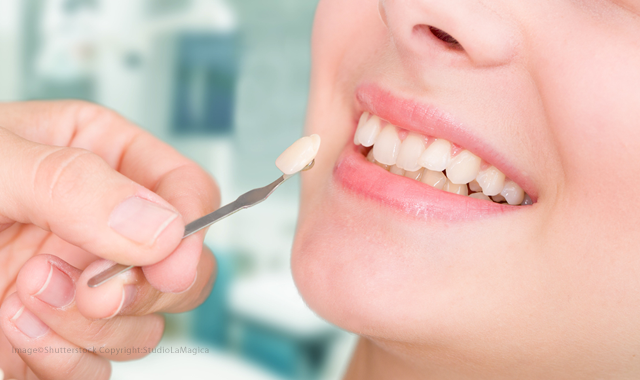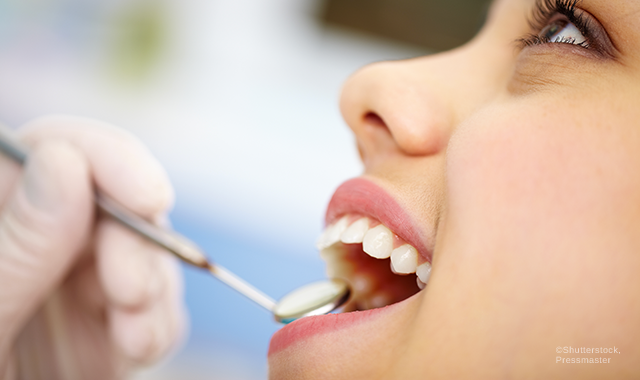5 questions patients usually have about cosmetic dentistry
When patients come to the dentist with requests for cosmetic dentistry, they present an opportunity for education. While many patients have an idea of what they want because they’ve seen the results of the procedure on someone else, other patients have little idea of what procedures are available to them - but they know they want to improve their smile somehow.

Read more: 6 most common cosmetic dentistry mistakes - and how to avoid them
This is a great opportunity for dentists to share the options available and inform patients of the process, cost and longevity of the procedure.
Click through the slides to find out common questions patients have about cosmetic dentistry procedures.


How can I improve my smile?
For John Rowe, DDS, AAACD, patients often ask how to get their teeth straighter, whiter, bigger, smaller, more even, or shaped differently.
“You have to have a good eye for how the smile fits the face,” he says. “You have to be an artist and be familiar with all the technical aspects of dentistry.”
It’s not just about treatment planning; it’s also about education, including knowing what patient education they’ve discovered on the internet. Sarah Jebreil, DDS, AAACD, says dentists should be aware of the content your patients are reading on the internet and be equipped to inform them about which products and services are available to them now.
Related reading: The evolution of cosmetic dentistry
“I find that there are a lot of misconceptions about what is available,” Dr. Rowe says. “Often, patients are unaware of the options they have or they are misinformed by something they read on the internet. It stands true that people complain publicly about bad results, but great results often go unnoticed. People request services just because they heard about them, regardless of the appropriateness of the treatment for them.”
He says that it’s important to note that common cosmetic procedures, such as clear aligner therapy or chairside whitening, aren’t the right treatment for everyone.
So, how can dentists be prepared and provide the right guidance to their patients? Listen.
“For the most part, I let the patient lead the conversation and answer their questions,” says Betsy Bakeman, DDS, FAACD.
Dentists can also help patients by providing several options, if they’re available, says Tanya L. DeSanto, DDS, FICD.
“Sometimes the smallest things that we do make a huge difference,” Dr. DeSanto says. “If someone comes in and is getting their teeth cleaned and they don’t like a rough spot on the edge of their tooth, just smoothing and shaping something makes them look more youthful. It doesn’t take long and can be done during the patient’s routine dental cleaning visit.”



How much will it cost?
The next question is a twofer: “How much does it all cost?” and “Do I have to pay for it all right now?” While elective dentistry is typically paid for before or at the time of service, dentists often make the price more manageable for patients by offering pricing plans.
Trending article: A new weapon in the fight against recurrent caries
“I think the biggest concern people have is the cost,” Dr. DeSanto says. “Most of the time, insurance isn’t covering elective things, or they have a maximum with their plan. Finances are a big deal, but there are lots of options for that, like interest-free financing programs like CareCredit.”
Regardless of the options used, allowing payments to be more flexible makes cosmetic procedures more accessible to your patients.



Are you going to prepare my tooth down to a nub?
Patients are often concerned that preparing their teeth means losing most of their natural structure. As a result, this question is brought up quite often.
“The biggest thing that I have seen is that patients don’t want their teeth prepared,” says John F. Weston, DDS, FAACD. “They don’t want their teeth ‘ground down to little points.’”
More from the author: How technology is changing the implant workflow
He adds that patients aren’t aware that modern materials don’t require as much shaping as did older materials and can even be done without grinding on the teeth at all, in some cases.
Dr. Jebreil has heard the same questions, which she attributes to patients doing research online and reading about traumatic experiences. At the very least, many patients just have little understanding about what their options are and what they entail.
“Often times when I talk about veneers, some patients respond with ‘I don’t want fake teeth,’” she says. “They request ‘bonding’ when they don't realize that whether it’s a thin piece of porcelain or a thin piece of composite, they are both covering the tooth, and with the proper planning and skill, both can be beautiful, conservative and seamless.”



What will the end result look like?
One aspect of not knowing the gamut of options is that patients want to know what it will look like when the treatment is finished, especially on their own face. Here is where models and digital photography come in handy.
Related reading: 4 easy ways to get into cosmetic dentistry
“Sometimes I show the patient a model,” Dr. Bakeman says. “A lot of us are visual. If a patient inquires about tooth preparation and if there is a need for it, I will get out a model of veneers and show them how much we would prepare the teeth. Seeing something in three dimensions can be very helpful."



How long will it last?
Just like dentists, patients want to know if they’re getting a return on their investment. They want to know how far their money is going. The answer, of course, is conditional.
“If the underlying parameters are right - if the bite is right and the mouth is healthy - it has the potential to last a lifetime,” says Fred H. Peck, DDS, AAACD. “But you have to explain to the patient that there are things outside the dentist’s control on longevity.”
For example, patients who grind their teeth are putting much more force on their teeth and are much more likely to chip their teeth than someone who doesn’t have bruxism. If those patients take preventive measures, such as wearing a nightguard to protect their teeth, then they’re more likely to get a long life out of their restorations.
More from the author: 6 cosmetic dentistry procedures every practice should offer
“To get cosmetic dentistry to last, you have to maintain the restorations properly,” Dr. Weston says. “That means proper bite guards, hygiene recalls, yearly doctor exams and X-rays.”
Overall, the questions vary from person to person. While some patients want to know the nitty-gritty details, others just want to know what they can expect of the result and the cost. The best thing a dentist can do is let the patient lead the conversation and answer his or her questions as they arise, and the best way to do that is to be prepared.
“Everybody says they’re a cosmetic dentist, but if you really want to do it correctly, there is much to learn,” Dr. Peck says. “You have to go to the right courses, learn the underlying theory and science behind the materials and techniques, and then go forward.”
To get started and learn more about cosmetic dentistry and the American Academy of Cosmetic Denstistry, visit aacd.com.
